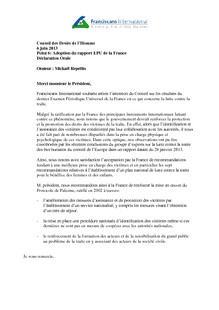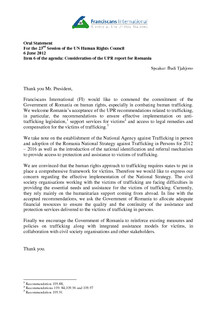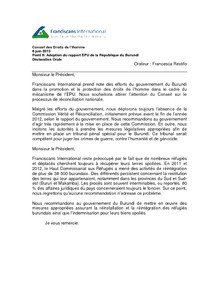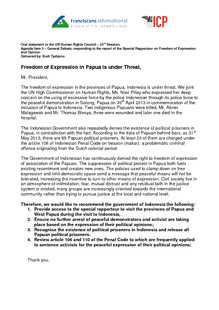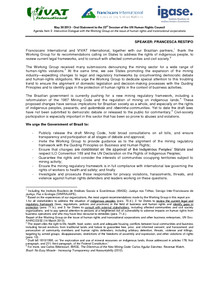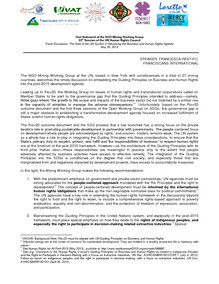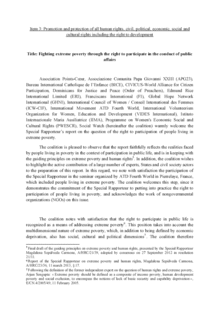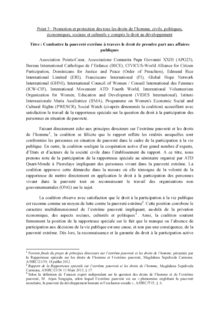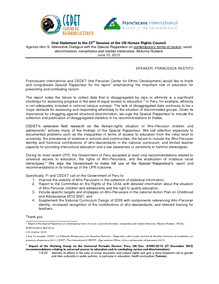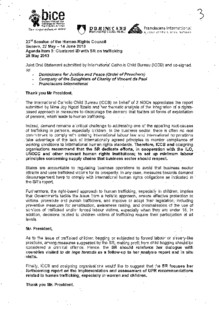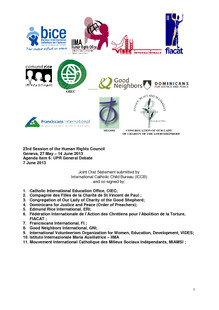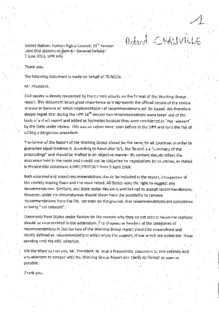FI statements during the 23rd Session
At the occasion of the 23rd Session of the UN Human Rights Council (27th May – 14th June 2013), FI took the floor eight times to deliver its oral statements, and supporting three other joint statements. On the country specific issues, FI drew the attention of the UN member states on the trafficking issues in Romania and France during the adoption of UPR France and UPR Romania, as well as the peace consolidation process and access to land during the UPR Burundi, and the issue of freedom of expression of the indigenous Papuans, in Indonesia. FI also addressed the issue of legal and regulatory framework for mining in Brazil; the equal access to education in Peru, especially for the Afro-Peruvian. On thematic issues, FI delivered and co-sponsored statement on the people center approach at the UN discussion on sustainable development; the role of the UN System in advancing the Business and Human Rights agenda; the important to set up minimum labour principles concerning supply chains that business sector should respect as part of the effort to combating trafficking in person; public participation in the decision making of the people who live in extreme poverty; and two other statements for the improvement of cooperation between the UN member states and the UPR Mechanism.
UPR France
Franciscans International a attiré l’attention du Conseil sur la lutte contre la traite in France. Malgré la ratification par la France des principaux instruments internationaux luttant contre ce phénomène, nous notons que le gouvernement devrait renforcer la protection et la promotion des droits des victimes de la traite. En effet, alors que l’identification et l’assistance des victimes est conditionné par leur collaboration avec les autorités, il nous a été fait part de nombreuses disparités dans la prise en charge physique et psychologique de ces victimes.
UPR Romania
Franciscans International (FI) commended the commitment of Romania in combating human trafficking and welcomed Romania’s acceptance of the UPR recommendations related to trafficking, in particular, the recommendations to ensure effective implementation on anti-trafficking legislation, support services for victims and access to legal remedies and compensation for the victims of trafficking. FI encouraged the Government of Romania to reinforce existing measures and policies on trafficking along with integrated assistance models for victims, in collaboration with civil society organisations and other stakeholders.
UPR Burundi
Franciscans International a pris note des efforts du gouvernement du Burundi dans la promotion et la protection des droits de l’homme dans le cadre du mécanisme de l’EPU et souhaité attirer l’attention du Conseil sur le processus de réconciliation nationale. Malgré les efforts du gouvernement, FI a déploré toujours l’absence de la Commission Vérité et Réconciliation, initialement prévue avant la fin de l’année 2012, selon le rapport du gouvernement et recommandé au gouvernement d’agir très rapidement à la mise en place de cette Commission.
Freedom of Expression in Papua (joint statement)
The Government of Indonesian has continuously denied the right to freedom of expression of association of the Papuan. The suppression of political protest in Papua both fuels existing resentment and creates new ones. The policies used to clamp down on free expression and limit democratic space send a message that peaceful means will not be tolerated, increasing the incentive to turn to other means of expression. Civil society live in an atmosphere of intimidation, fear, mutual distrust and any residual faith in the justice system is eroded, many groups are increasingly oriented towards the international community rather than trying to pursue justice at the local and national level.
Legal and regulatory Framework for Mining in Brazil (joint statement)
Franciscans International on behalf of the Working Group on Mining received many submissions denouncing the mining sector for a wide range of human-rights violations. At the same time, we see States promoting the expansion of the mining industry—expediting changes to legal and regulatory frameworks by circumventing democratic debate and human-rights obligations. We urge the Working Group to dedicate special attention to this troubling trend to ensure the alignment of domestic legislation and decision-making processes with the Guiding Principles and to identify gaps in the protection of human rights in the context of business activities.
The role of the UN System in advancing the Business and Human Rights agenda (joint statement)
Leading up to Rio+20, the Working Group on issues of human rights and transnational corporations called on Member States to be alert to the governance gap that the Guiding Principles intended to address—namely, those gaps where “the growth in the scope and impacts of the business sector [is] not matched by a similar rise in the capacity of societies to manage the adverse consequences.” Unfortunately, based on the Rio+20 outcome document and the first three sessions of the Open Working Group on SDGs, this governance gap is still a major obstacle to establishing a transformative development agenda focused on increased fulfilment of States solemn human-rights obligations.
Participation publique et pauvreté extrême (déclaration conjointe)
La coalition observe avec satisfaction que le droit à la participation à la vie publique est reconnu comme un moyen de lutte contre la pauvreté extrême. Cette position corrobore le caractère multidimensionnel de l’extrême pauvreté impliquant, au-delà de la privation économique, des aspects sociaux, culturels et politique. Ainsi, la coalition soutient fermement la position de la rapporteuse spéciale sur le fait que le manque ou l’absence de participation aux décisions de la vie publique est une cause, et non pas une conséquence, de la pauvreté extrême. Dès lors, la reconnaissance et la garantie du droit à la participation active.
Access to education for Afro-Peruvians (joint statement)
FI and Peruvian Centre for Ethnic Development called attention faced by the Afro-Peruvians, such as: inequality in terms of access to education, from the initial level to university; high levels of violence in schools and communities; the failure to include the Afro-Peruvian identity and historical contributions of afro-descendants in the Ministry of Education’s national curriculum; and a limited capacity for providing intercultural education and low awareness of harmful stereotypes among teachers.
Trafficking of women and children (joint statement)
The Coalition expressed its view that the demand remains a critical challenge to addressing one of the appalling root-causes of trafficking in persons, especially children. In the business sector, there is often no real commitment to comply with existing international labour law and international corporations take advantage of the lack of internationally agreed principles to monitor compliance of working conditions to international human rights standards. Therefore, the Coalition recommends that the SR dedicate efforts, in cooperation with the ILO, UNODC and other relevant human rights institutions; to set up minimum labour principles concerning supply chains that business sector should respect.
Cooperation with UPR Mechanism (1st joint statement)
FI supported a joint statement prepared by the International Catholic Child Bureau which suggested that the UN members States that make recommendations during the UPR process should assist, support and follow-up the implementation process of their recommendations. This could be done, inter alia, through bilateral dialogue and cooperation but also during the general debate under agenda item 6 of the Council. Furthermore, panels, interactive dialogues with country and thematic mandate holders and the High Commissioner for Human Rights, general debates, as well as decisions and conclusions, offer opportunities for States to follow-up on their recommendations.
Cooperation with UPR Mechanism (2nd joint statement)
FI also supported the joint statement of 77 NGOs which was prepared by UPR Info. In this statement, the civil society is deeply concerned by the current attacks on the format of the UPR Working Group report. This document bears great importance as it represents the official record of the review process in Geneva on which the implementation will be based. Therefore the civil society deeply regretted that two recommendations were taken out of a draft report at the UPR 16th session because they were considered as "not relevant" by the State under review. This was an action never seen before in the UPR and runs the risk of setting a dangerous precedent.


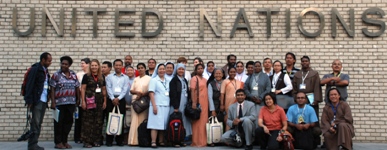

 Franciscans International
Franciscans International